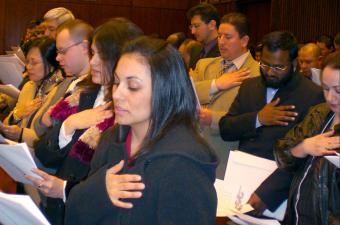Integration Policy
Integration Policy
Recent Activity
Recent Activity
Articles
December 16, 2015
President Obama actively utilized the powers of the executive to reshape U.S. immigration policy in 2015. From signature deportation relief programs and changes to visa waiver eligibility to new grants of Temporary Protected Status and revised enforcement priorities, the administration made sweeping changes that touch all aspects of U.S. immigration policy. The actions prompted pushback, however, with 26 states suing to halt implementation of new deferred action programs.
















New Education Legislation Includes Important Policies for English Learners, Potential Pitfalls for their Advocates